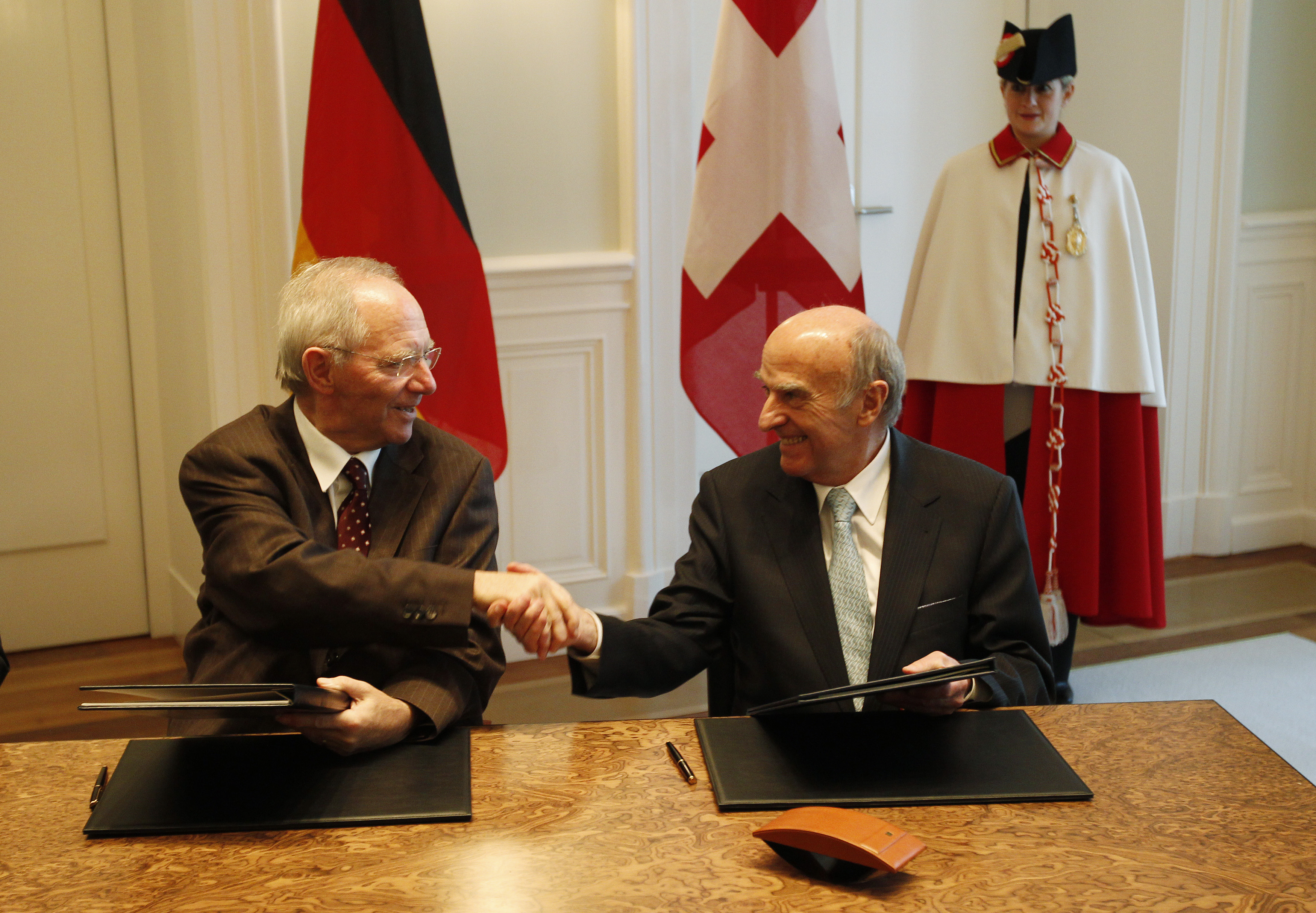Swiss and Germans agree to talk on tax

Switzerland and Germany have agreed to launch negotiations aimed at legalising undeclared assets in Swiss bank accounts.
Finance Minister Hans-Rudolf Merz and his German counterpart, Wolfgang Schäuble, signed a joint declaration for formal talks on tax issues as well as a revised Double Taxation Agreement in line with international standards.
At a news conference, Merz described the signing of the declaration as a “milestone”.
The negotiations to begin early next year will cover extended cross-border cooperation on tax matters and improved access for banks, according to a statement by the Swiss finance ministry on Wednesday.
“Both sides want that a new solution would enable distortions to competition in terms of tax issues to be avoided. German taxpayers should not be deterred from holding a bank account in Switzerland,” the statement said.
The level of undisclosed assets from German customers in Swiss bank accounts remains unclear, however it was estimated by the former German finance minister, Peer Steinbrück, at around €200 billion.
The terms of the deal, which are to be clarified during the negotiations and which are subject to approval by parliament, include the untaxed existing assets of the past and the introduction of a withholding tax for the future. The rate still has to be negotiated.
Both countries also plan to resolve the issue of mutual market access for financial institutions, including the controversial purchasing of tax collection data.
Tax issues have marred bilateral relations between Switzerland and its biggest trading partner over the past few years.
Several cases of stolen data, allegedly revealing the identity of German clients who dodged taxes by placing their money in Swiss bank accounts, provoked further irritation.
The Swiss Bankers Association (SBA) welcomed the move. “The consensus represents an important milestone in the bilateral relationship between Germany and Switzerland and will help to normalise relations between the two countries,” Patrick Odier, SBA Chairman, said on the association’s website.
Wednesday’s signing ceremony in the capital, Bern, came only days after an agreement with Britain to negotiate a new withholding tax on deposits in Switzerland.
Setback for EU
Both deals are seen a potential dampener for European Union efforts to enforce the automatic exchange of information on account holders’ details.
Tax law expert Robert Waldburger of St Gallen University rejects demands by the 27-nation bloc to make other countries outside the EU comply.
He says the EU has set the automatic exchange of information as a goal, but it is not a universally applied rule.
“This position does not concern Switzerland as a non-EU member,” Waldburger said in an interview with public television ahead of Wednesday’s signing ceremony.
However, Brussels does not appear willing to give up easily.
Michael Reiterer, EU ambassador to Switzerland, was quoted as saying Brussels was in touch with Germany and Britain and the union was convinced that the automatic exchange of information was “more efficient” than a withholding tax.
Banking secrecy
Martin Jansen, economics professor at Zurich University, says the agreement with Germany, but also with Britain, will have a major impact on Switzerland’s banking industry because of the flight of capital to other countries.
However, he rejects allegations that it is the end of traditional banking secrecy.
“No client data will be handed out. But the asset management business will change dramatically in the future;” he told the Tages-Anzeiger and Der Bund newspapers on Tuesday.
For René Schwok, political scientist at Geneva University, Switzerland got a very good deal and looks likely to push through its interests against those of the EU.
“Switzerland is about to achieve what was considered impossible by many observers not that long ago,” Schwok told swissinfo.ch.
He added that Switzerland had succeeded in dividing the 27-nation bloc in a political and economic context where some member countries are willing to sacrifice the principles of the union to get more tax revenue for themselves.
Banking secrecy was enshrined in Swiss law in 1934. For the past 18 months Switzerland has been under continuous attack for helping foreign tax evaders hide their assets.
The OECD placed Switzerland on a “grey list” of uncooperative tax havens in April 2009. The Swiss were removed in September after renegotiating more than 12 double taxation treaties, but they have refused to automatically transfer information to tax investigators without proof of crimes.
Several countries, including Italy, France, Britain and the US, launched tax amnesties last year in an effort to repatriate assets from tax cheats.
Switzerland was particularly annoyed at the aggressive Italian amnesty that saw surveillance and tailing of cross border suspects entering Switzerland.
The most damaging tax evasion case involved the activities of UBS bank in the US. In February 2009, UBS was fined $780 million after admitting helping US citizens dodge taxes. It also handed over data of 285 account holders.
In September, the Swiss government agreed to transfer the details of 4,450 UBS clients to the US – in effect violating Swiss banking secrecy to prevent a ruinous court case for UBS.
Also last year, a former employee of the HSBC private bank in Geneva ran away with client data that he handed over to the French authorities.
Several CDs of stolen Swiss banking data have been bought by the German authorities.
(with input from Pierre-François Besson)

In compliance with the JTI standards
More: SWI swissinfo.ch certified by the Journalism Trust Initiative













You can find an overview of ongoing debates with our journalists here . Please join us!
If you want to start a conversation about a topic raised in this article or want to report factual errors, email us at english@swissinfo.ch.